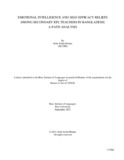Emotional intelligence and self-efficacy beliefs among secondary EFL teachers in Bangladesh: a path analysis

View/
Date
2021-09Publisher
Brac UniversityAuthor
Rimpu, Sefat JeshinMetadata
Show full item recordAbstract
This study investigated into the correlation among age, gender and emotional intelligence as well the influence of Emotional intelligence on teachers’ self-efficacy beliefs. The study followed quantitative method whereas secondary school teachers (N= 62) completed the self-reported trait emotional questionnaire (TEIQue) and teachers’ self-efficacy beliefs short version questionnaire by Tschannen-Moran and Woolfolk-Hoy (2001).Findings showed that age correlates with emotional intelligence whereas gender does not have any correlation with Trait EI. The findings of regression analysis showed that emotional intelligence influences on self-efficacy beliefs and correlates with the scales as well. The path analysis revealed that age has direct influence on EI but indirect influence on self-efficacy beliefs in classroom management whereas EI has direct influence on self-efficacy beliefs in classroom management. These findings highlight on the multifaceted nature of Emotional intelligence and its pivotal role on EFL teachers’ efficacy beliefs. Theoretical, conceptual and practical implications along with limitations of the study have been discussed accordingly.
